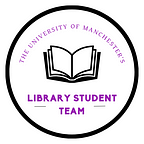ITL Conference 2023: Library Student Team Reflection
In July 2023, the University of Manchester held its Institution of Teaching and Learning Conference, hosting internal speakers at the University as well as some panel members from other higher education institutions. The Library Student Team were ready and raring to go. Student Team member Durian “armed with walkie-talkies” to keep the day flowing during and around the various talks and discussions held across multiple rooms at the Pendulum Hotel. Another team member, Angelica also enjoyed the hilarities of the technical details:
“…from sticking names on lanyards during registration, to wiggling the mice so that the screen wouldn’t turn off, to making the videographer’s life harder by accident, whatever menial task it was, I had so much fun!”
In the afternoon the team held an inquisitive panel session followed by breakout groups, using the Library Student Team as a case and context for exploring the idea of what it means to belong as a student at the University of Manchester as well as within higher education generally. The session was led with a wicked problem approach in acknowledging that the idea of belonging is complex both with what currently exists within a university.
Staff-student partnerships
Tabita kicked off with the first topic of the panel discussion focusing on staff-student partnerships. She highlighted the current feedback systems in place for student experience such as Student Reps and various one-off surveys of which the latter was raised to have the barrier of not being able to shape and contribute to solving problems for students until the end of a semester or academic year. They “do not have a direct impact on current students enrolled on a particular course or at university in general…” and “mostly directed to improving the delivery of teaching and learning for the next cohort”, meaning those currently studying do not benefit from their feedback.
The benefit of holding this discussion with multiple stakeholders within the University also enabled conversation to take place around enabling support required for students.
“Gathering perspectives from people who work in three different roles gave us a better understanding of the barriers staff face when engaging with students.”
After exchanging email addresses, it is positive to hear the group have followed up with each other after the conference.
Accessibility
The panel discussed accessibility of students from a general perspective as well as her own lived experience of neurodiversity and disability. Student team member Rachel who led this focus hopes that the “relevant voices are continued to be heard and are also able to lead important conversations to encourage others to make the required changes.”
Discussion took place around awareness of comfortableness appearing online in a call with a lot of participants. An idea to help the student with this would be to speak to the individual beforehand to ask this question, and how they would like to communicate with others also recognising this may change over time.
A key topic that came up was questions of responsibility: who the responsibility lies with and what this responsibility is (including contextual nuances). Training for university staff — how to go about having a conversation about needs and support led on from this as a potential to help with this barrier.
One takeaway for improving practise is to never assume that what works for one person will work for another — which may also change over time. Also, use simple language and clear communications as well as allowing the person the time they need to communicate their needs/ideas.
Prayer spaces
Prayer spaces were addressed by Iqra. She highlighted the barriers to prayer spaces including impact of timetabling systems, reluctance to make the spaces available which has led to prayer spaces being inconvenient and uncomfortable. In referring to her enjoyment working within the student team she highlights, “we are an extremely diverse team and to be able to listen to each other’s concerns, validate their feelings and suggest proactive tips ensured for a productive session.” A suggested solution included staff learning where multi-faith prayer spaces are on campus to sign post as well as advocate for more space.
Iqra also spoke at the opening plenary session about racialised inequalities in Higher Education. She raised the problems around “micro-aggressions towards Muslim students” and many lack of alignment and inclusion of different values such as student lifestyles often being “central to alcohol and partying”. Iqra noted eye opening responses from professionals with one person describing feeling “uncomfortable in an insightful way”. The person was able to “reflect on how unaware people may be towards these issues, alongside what actions she needs to take to help.”
Student Team member Angelica reiterated how much this is also important to her:
“This is such an essential part of our student/staff lives, and something that is especially significant to me as a Muslim student always looking (and failing) to secure a prayer space in library spaces.”
Final remarks
The day was a great opportunity to openly discuss and challenge others on the issues faced by students. Having the student team facilitate a session around this will hopefully be something for others at the University to consider when discussing the challenges and hardships faced by students. After all, who better to provide a voice to than the people who need to be heard. However, the question stands on whether teachers, and learning professionals alike, retained the information disseminated at the conference, and whether they’ll go on to use informed practices in their future teaching.
